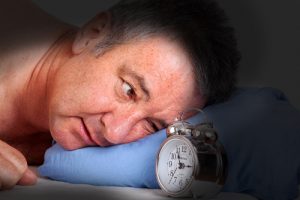 One of the most common causes of Testosterone Deficiency in men that have not yet experienced Andropause is poor sleeping habits.
One of the most common causes of Testosterone Deficiency in men that have not yet experienced Andropause is poor sleeping habits.
For your body to produce the testosterone that it needs to amplify your day-to-day health, you need 7-9 hours of restful sleep per night, but too many men don't get enough.
Across the United States, there are nine million men and women that take prescription medications to help them sleep. Healthy sleep is also necessary for your body to adequately produce Human Growth Hormone, which is produced primarily during sleep and helps to promote cellular metabolism and healing processes.
Video Link: https://vimeo.com/291313565
Video Download: Click Here To Download Video
Video Stream: Click Here To Stream Video
Video Link: https://vimeo.com/291313677
Video Download: Click Here To Download Video
Video Stream: Click Here To Stream Video
Unfortunately, often, these sleeping pills produce side-effects in many patients, and for many, the products are not useful.
Because of the potential risks associated with many sleep aids, including the potential risk for abuse, many health professionals feel that these medications should only be used short-term to help restore healthier sleeping habits.
Of course, even if you aren't interested in using a prescription treatment, you should still see a medical professional if you are experiencing a significant sleep disorder, such as insomnia.
There are a lot of ways to effectively treat such conditions without turning to pills or other prescription treatments. Still, many in today's society are predisposed to the quick fix and aren't adequately made aware of other alternative methods that can be just as, if not more, effective, without the risk of side-effects.
If you are having trouble sleeping, before turning to over-the-counter or prescription sleep aids, here are some steps that you can take to improve your sleeping habits, and hopefully get the rest that your body needs to promote hormone balance and optimal health.
Don't Spend Too Much Time in Bed to Improve Sleep Quality
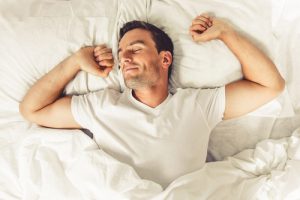 One big reason why people have issues getting to bed is that they spend too much time with their minds active in the bedroom.
One big reason why people have issues getting to bed is that they spend too much time with their minds active in the bedroom.
They watch television under the covers, or play games or read Facebook on their computer.
The bed is supposed to symbolize sleep, but too often, people eat, play, and work in bed, and this prevents their brains from turning off and can lead to significant issues in falling asleep.
Also, staying in bed too much can keep a person's mind racing, and can lead to feelings of worry and frustration. If you are having trouble sleeping, the best thing that you can do is get out of bed for a little while and find something to occupy your time.
If you spend your time worrying in bed instead of sleeping, your brain will get accustomed to the practice, which can lead to long-term sleeping issues. Spend a half-hour to an hour occupying yourself somewhere else in the house, but don't over-stimulate yourself.
Spend some time reading, or do something else that you enjoy that doesn't involve intense lighting.
Cognitive Therapy to Improve Sleeping Habits
One of the best things that you can do to improve your sleeping habits is to visit a psychologist or sleep specialist for Cognitive Behavioral Therapy. These treatments don't involve medicine; they encourage mindfulness and self-awareness to promote better sleeping habits. This sort of treatment often includes tools such as sleep journals, which help you become more aware of your sleeping habits, and what may be preventing you from getting the rest that you need.
By becoming aware of how you sleep, you can take steps to enhance your sleep, through mindful changes.
These therapy sessions have a large body of evidence behind them and are considered the most successful method to alter and improve sleeping habits.
Meditation for Improved Sleeping Habits
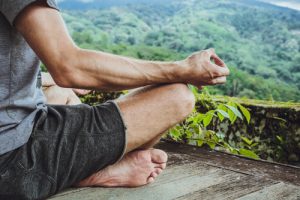 Many people think of meditation as some sort of distant, somewhat exotic activity, but it's not all that difficult to learn how to meditate yourself.
Many people think of meditation as some sort of distant, somewhat exotic activity, but it's not all that difficult to learn how to meditate yourself.
Engaging in quiet, mindful meditation, that consists of slowing your mind down and recognizing the way that your body and mind interact, can do wonders for your anxiety levels and your ability to relax and wind down for bed.
Engaging in this very psychological form of relaxation provides direct and undeniable benefits about muscle and body relaxation.
Men and women that engage in meditation regularly report improved sleeping habits and relief from daytime fatigue.
Just ten minutes of meditation, combined with deep breathing, has been shown to change sleep quality for many patients radically.
Progressive Muscle Relaxation for Better Sleep
Progressive Muscle Relaxation is a strategy that was first invented around 100 years ago but has stood the test of time and remains an effective way to relax physically.
With this technique, you flex muscle groups throughout the body just before resting them, moving from your extremities, inward. This is almost a form of self-massage, where you train your muscles to relax, which improves function, enhances circulation, and promotes better sleep and psychological relief.
Clinical scientific research has shown that this treatment helps people sleep better, and it also tends to increase energy.
Physical Exercise for Better Sleep
 Most people associate increased energy with cardiovascular and anaerobic exercise, but did you know that exercise can also help you sleep?
Most people associate increased energy with cardiovascular and anaerobic exercise, but did you know that exercise can also help you sleep?
There are some reasons for this. For one, people that are in better shape have a lower resting heart rate, which means that it's easier to slow yourself down. They also tend to be more relaxed because your muscles relax more easily when you engage them more thoroughly. If you don't work out, you get tight and tense.
Exercise also relieves psychological stress, which makes it easier to rest at night. You don't have to work yourself to death. Even people that engage in light exercise experience significant benefits, on average, when it comes to sleep.
Take Soothing, Hot Baths Before Bed to Fall Asleep Easier
 There is scientific evidence that taking a hot bath can improve your ability to sleep more restfully.
There is scientific evidence that taking a hot bath can improve your ability to sleep more restfully.
Evidence suggests that baths can promote sleep because they elevate your core body temperature. When you fall asleep, your core body temperature drops modestly as a result of your body's metabolism dropping.
When you get out of the bathtub at night, your body emulates this temperature change, dropping from a slightly higher average temperature, and your mind responds by putting you in a more relaxed and restful state.
Research shows that individuals that take baths before bed in warm or hot water wake up more fully rested and fall asleep faster, on average.
Learn Yoga to Sleep Better
Yoga is related to meditation but is highly physical with an emphasis on stretching, balance, and stability.
There has been no clinical research that demonstrates the benefits of yoga. Still, the mixture of physical and psychological mindfulness and awareness combines the benefits of physical fitness with that of meditation.
As you get better at yoga, you can try more challenging positions, and your body will adapt and become stronger. Afterward, the relaxation of both body and mind will make it easier to sleep restfully.
Of course, more challenging poses may not be ideal for bedtime because advanced yoga poses can be quite a workout.
However, some basic poses can provide the benefits of yoga without overly stimulating the body.
Aromatherapy for Better Sleep
Animal researchers and theorists claim that scent was the first sense to form in animals. The sense of smell is mostly a primary way for the body to sense and react to chemical stimulation.
Of course, our other senses have grown significantly important, and the scent is arguably the least important of the five human senses. However, smells and aromas can still have a powerful effect on the human mind.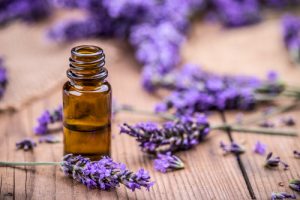
Some scents have been scientifically proven to promote relaxation and sleep, most notably lavender. Research has shown that smelling lavender before falling asleep promotes healthier and more restful sleep.
Studies have also shown that the scent can help treat patients that have insomnia, allowing them to overcome their condition and get to sleep more quickly.
Supplements to Sleep Better
There are a lot of supplements out there that purport to help people sleep better. Of course, the issue with supplements is that they are not well-regulated, and the body of research is incomplete for many of these over the counter substances.
Luckily, most supplements that are sold for sleep are perfectly safe, and there is some research out there to help you pick a sleep aid that may work for you.
Finally, although supplements aren't regulated by the Food and Drug Administration, there are many companies and organizations which provide quality control and provide products that you can trust.
One of the most commonly discussed and used sleep supplements is Melatonin. It's important to note, however, that Melatonin is not a cure-all and may not even be right for you.
Melatonin is best used for conditions which leave the circadian rhythm out of sync. For example, it is highly effective at treating patients with jet lag.
The best way to use Melatonin isn't to take it immediately before bed, as so many do, it's best to take the supplement two or three hours before bed, around sundown, when the body starts typically to increase its natural secretion of the hormone.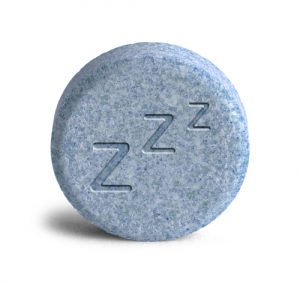
Another supplement that helps to promote healthy sleep is L-theanine, which is a natural ingredient of herbal teas, most potently found in green tea.
Of course, to get the most benefit out of this amino acid, you would have to drink a lot of tea, enough to risk waking you up in the middle of the night to go. To get the best benefits of restful sleep, it's best to take this amino acid in supplement form.
A third over the counter sleep aid that is commonly available is Valerian, an herbal supplement that is concentrated from the root of the Valerian plant.
There has been some research conducted on this supplement, which shows that it does have some impact on relaxation. It appears to be best for modest sleep problems, but it likely won't be sufficient for significant sleep problems such as insomnia.
Rearrange Your Bedroom and Design it for Optimal Relaxation and Restfulness
Many people that have trouble sleeping lose the ability to see their bedroom as a place suitable for good and healthy sleep. Others keep messy rooms or have other issues that deny them their ability to sleep well without even realizing it.
Think of ways to spruce up your bedroom to make it more comfortable. Get some new sheets or pillows, for example. If your mattress isn't working out for you, buy a new one, or at least buy an affordable, padded cover to make sleeping more comfortable.
It's also essential to block light to sleep more soundly.
Even the light from your alarm or a street light through your curtains can be enough to disrupt quality sleep.
Equally important is to shield yourself from sound. One of the biggest culprits for poor sleep these days is the cell phone. They produce light and noise, which can distract you from sleeping, or worse, wake you up in the middle of the night.
Many people find that just making the concerted effort to keep the phone out of the bedroom is enough to improve sleep quality significantly.
Stop Smoking to Sleep Better
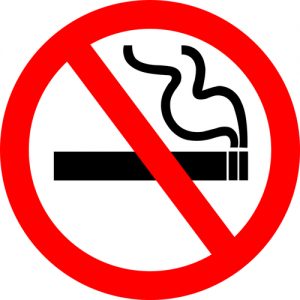 Smoking indeed does affect health in a myriad of ways. Smoking even makes it harder to sleep well and increases feelings of fatigue.
Smoking indeed does affect health in a myriad of ways. Smoking even makes it harder to sleep well and increases feelings of fatigue.
Most people don't think about it, but nicotine, the primary addictive ingredient of cigarettes and cigars, is a stimulant.
Research has shown that people that smoke are 400% more likely to wake up fatigued and exhausted than those that don't smoke.
Herbal Teas can Improve Sleep Quality
In addition to Green Tea, which contains L-Theanine, there are many teas that can help you sleep, the most common of which include Chamomile or Valerian.
Many companies make teas that are specifically designed to help you sleep better. Drinking hot tea also mimics your body's temperature adjustment process, which occurs when you fall asleep.
Your body warms up when you drink the tea, and as your body cools down, it promotes a healthy feeling of sleepiness that helps you fall asleep more soundly.
Don't Drink Caffeine Before Bed
 This should come as a no-brainer, but way too many people don't follow this rule.
This should come as a no-brainer, but way too many people don't follow this rule.
Caffeine is a stimulant that mimics Adenosine in the brain, which promotes a feeling of wakefulness or anxiety when consumed in excess or at the wrong times.
Caffeine stays in one's system for a long time—after 5 hours, your body metabolizes half of the caffeine that you consumed. The later that you drank your last cup of coffee or soda, the more likely you are going to have problems when you try to fall asleep.
To prevent caffeine from negatively influencing your sleeping habits, stop ingesting caffeine in any form around lunchtime or shortly after.
References
Contact Us Today For A Free Consultation

- Ten Simple Steps That You Can Take To Knock Out Stress [Last Updated On: May 2nd, 2024] [Originally Added On: June 11th, 2020]
- Ten Ways to Manage Cholesterol and Testosterone Levels [Last Updated On: May 30th, 2024] [Originally Added On: July 16th, 2020]
- Five Kinds of People that Have a Lot of Sex! [Last Updated On: April 11th, 2024] [Originally Added On: July 17th, 2020]
- Ditch the Alcohol if You Want to Maximize the Benefits and Gains From Weightlifting [Last Updated On: January 22nd, 2024] [Originally Added On: July 18th, 2020]
- 13 Issues That Can Kill Your Libido [Last Updated On: March 15th, 2024] [Originally Added On: July 19th, 2020]
- Ten Ways to Enhance Your Metabolism [Last Updated On: June 28th, 2024] [Originally Added On: July 20th, 2020]
- Fourteen Common Causes of Fatigue and What You Can Do to Improve Your Energy Levels! [Last Updated On: June 21st, 2024] [Originally Added On: August 4th, 2020]
- Testosterone's Effects Upon the Human Body [Last Updated On: June 11th, 2024] [Originally Added On: August 9th, 2020]
- Fifteen Foods That Can Help You Get Your LDL Cholesterol Under Control [Last Updated On: May 1st, 2024] [Originally Added On: November 28th, 2020]
- Exercise Optimizes Testosterone Production [Last Updated On: January 29th, 2024] [Originally Added On: February 13th, 2021]
- How to Get Bigger Arms [Last Updated On: November 25th, 2024] [Originally Added On: March 14th, 2021]
- It’s True: Stress Causes Hair Loss and Thinning Hair, According to Science [Last Updated On: August 29th, 2024] [Originally Added On: May 4th, 2021]
- Magnesium and Preventing Kidney Stones [Last Updated On: October 22nd, 2024] [Originally Added On: January 18th, 2023]
- Get Pro-active, Don’t Depend on a GP only! [Last Updated On: October 24th, 2024] [Originally Added On: February 1st, 2023]
Word Count: 2158





















